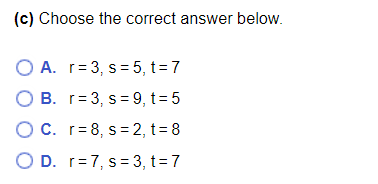The notions of the greatest common divisor and the least common multiple extend naturally to more than two numbers. Moreover, the prime-factorization method extends naturally to finding GCD(a, b, c) ar LCM(a, b, c). (a) If a = 32 . 52 . 73 b = 33 .51 . 7', and c = 22 • 53 .71, compute GCD(a, b, c) and LCM(a, b, c). (b)ls it necessarily true that GCD(a, b, c) • LCM(a, b, c) = abc? (c) Find numbers r, s, and t such that GCD(r, s, t) • LCM(r, s, t) = rst.
The notions of the greatest common divisor and the least common multiple extend naturally to more than two numbers. Moreover, the prime-factorization method extends naturally to finding GCD(a, b, c) ar LCM(a, b, c). (a) If a = 32 . 52 . 73 b = 33 .51 . 7', and c = 22 • 53 .71, compute GCD(a, b, c) and LCM(a, b, c). (b)ls it necessarily true that GCD(a, b, c) • LCM(a, b, c) = abc? (c) Find numbers r, s, and t such that GCD(r, s, t) • LCM(r, s, t) = rst.
Algebra & Trigonometry with Analytic Geometry
13th Edition
ISBN:9781133382119
Author:Swokowski
Publisher:Swokowski
Chapter1: Fundamental Concepts Of Algebra
Section1.2: Exponents And Radicals
Problem 92E
Related questions
Question

Transcribed Image Text:The notions of the greatest common divisor and the least common multiple extend naturally to more than two numbers. Moreover, the prime-factorization method extends naturally to finding GCD(a, b, c) and
LCM(a, b, c).
(a) If a = 32 .52 .73, b = 33.51.71, and c= 22 .53.7', compute GCD(a, b, c) and LCM(a, b, c).
(b)ls it necessarily true that GCD(a, b, c)• LCM(a, b, c) = abc?
(c) Find numbers r, s, and t such that GCD(r, s, t) •LCM(r, s, t) = rst.
(a) GCD(a, b, c) = |
LCM(a, b, c) =
(b) Choose the correct answer below.
O A. Yes. Since the GCD is found using the larger exponents and the LCM is found using the smaller exponents, it must be true that GCD(a, b, c)• LCM(a, b, c) = abc.
O B. Yes. It is shown in part (a) that GCD(a, b, c) • LCM(a, b, c) = abc.
OC. Yes. Since the GCD is found using the smaller exponents and the LCM is found using the larger exponents, it must be true that GCD(a, b, c)• LCM(a, b, c) = abc.
D.
No it is not necessarily true that GCD(a b c)•I CM(a b c) = abc
OO C

Transcribed Image Text:(c) Choose the correct answer below.
O A. r=3, s=5, t=7
O B. r= 3, s =9, t= 5
O C. r=8, s=2, t= 8
O D. r=7, s= 3, t= 7
Expert Solution
This question has been solved!
Explore an expertly crafted, step-by-step solution for a thorough understanding of key concepts.
This is a popular solution!
Trending now
This is a popular solution!
Step by step
Solved in 3 steps

Knowledge Booster
Learn more about
Need a deep-dive on the concept behind this application? Look no further. Learn more about this topic, algebra and related others by exploring similar questions and additional content below.Recommended textbooks for you

Algebra & Trigonometry with Analytic Geometry
Algebra
ISBN:
9781133382119
Author:
Swokowski
Publisher:
Cengage


Algebra & Trigonometry with Analytic Geometry
Algebra
ISBN:
9781133382119
Author:
Swokowski
Publisher:
Cengage
